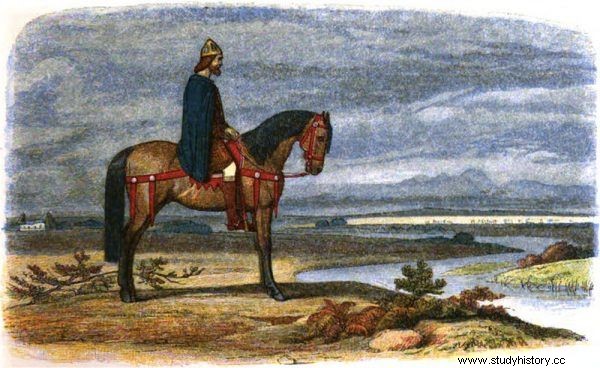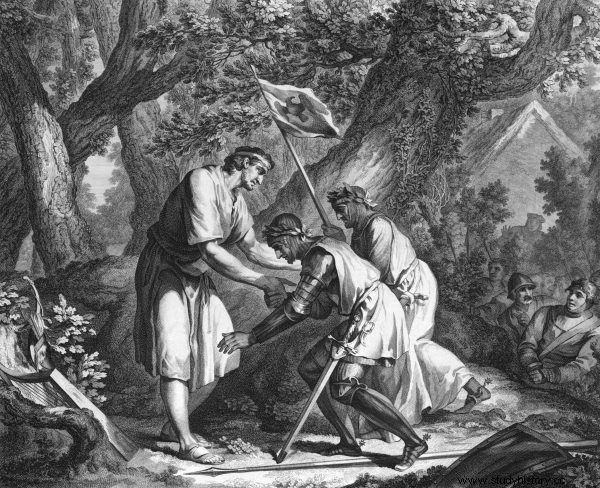He defied the Vikings and forced them to submit. He persuaded the King of the Danes, Guthrum, to be baptized. Finally - he united his country and laid the foundations for the development of his native culture. No wonder he was nicknamed "The Great". But was Alfred really such an outstanding ruler?
By assuming the throne of Wessex in 871, Alfred had no easy task. From the mid-ninth century, the Danish Normans continued their efforts to take over England. In 851 they established a winter camp on the island of Thanet, and fourteen years later the "Great Army" under the command of Halfdan and Ivar Bez Bones invaded the English lands.
The local population called the newcomers wicingas although in the chilling stories of their atrocities they also appeared as "Danes", "pagans", "strangers" or "people of the North." They subjugated East England, Northumbria and Mercia. Wessex became their target in 870. And despite resistance from the then ruler, Ethelred, they were not going to give up so easily. Especially that the king of the southern country was not favored by fortune. He fought his battles with the Danes with varying luck, and eventually died fighting them at Merton. After his death, his younger brother Alfred took over the crown.
"Harvest" of the people of the North
The reign of the new ruler did not promise to be calm or successful. Already at the beginning of his reign, he was defeated at Wilton and was forced to conclude a settlement with the invaders. The following years also did not bring any hope for an improvement in the situation. The truce with the Danish commander turned out to be temporary. In 876, a portion of the Grand Army under Guthrum captured Wareham in Dorset and then Exeter.

Alfred the Great with his brother in childhood.
The people of Wessex felt a pang of fear when in 878 the Vikings set out from the Gloucester base for their home country. The Warriors from the North raided Chippenham, which they took without much trouble. Alfred nearly escaped capture. Ultimately, however, it eluded the Danes and with a small force managed to make it to Athelney Island in the Somerset Levels wetlands.
Many legends have been written about the ruler's stay among the local swamps. According to one of them, the king in the disguise of a bard sneaked into the Viking encampment and overhearing their conversations, he learned about further plans for the conquest, which later ensured his victory. How was it really - hard to say. The fact is that in the spring of 878 Alfred's fortune finally turned and the ruler began to "earn" his nickname.
The time has come for the long-awaited revenge on the people of the North. Alfred amassed troops from Somerset Levels, Hampshire, Wiltshire and led them against the enemy. The clash took place at Edington, where the king and his subjects literally defeated their opponents . The Vikings resisting Chippenham held back for fifteen days, but they too had to surrender. Moreover, Guthrum undertook to be baptized and to leave Wessex once and for all. As the author of the "Anglo-Saxon Chronicle" wrote:
The invading army handed him hostages and swore that he would leave his kingdom and that their king would be baptized; they kept their word. Three weeks later, King Guthrum came to him as one of the thirty most worthy men in the army at Aller - and this is near Athenley - and the king received his baptism; chrism was sanctified at Wedmore.
Tireless invaders
It would seem that after the ceremony of collective baptism of Viking warriors, whose godfather was Alfred himself, the Danes would finally give up and give up conquering this part of England. Nothing could be more wrong. Still in the fall of 878 the Normans crossed the Thames and set up a camp at Fulham.
Alfred managed to defeat them again. Thus, the ruler of Wessex strengthened his position in the country, and was soon proclaimed king of all Anglo-Saxons . Over the next years, he bravely defended the inhabitants of his country against further invasions. And there was someone to fight, the warriors from the North turned out to be extremely stubborn.
Their first major attack since the Battle of Edington took place in 884. The crew of Anglo-Saxon ships, which two years earlier had intercepted four enemy units near the shores of the English Strait, was this time unable to stop the Danish fleet from the Frankish territories. The Normans attacked the English lands from Kent, and Guthrum gave support to his people.
Alfred found himself in a difficult situation again. Despite this, he managed to beat the Danes without any major losses of his own. He finished victories in Kent and Essex with the capture of London in 886. He then made a pact with Guthrum marking the border between their countries . The new boundary ran from the mouth of the River Lei to the Thames, then to Bedford and then on to Watling Street. Moreover, the agreement was to secure the rights of Anglo-Saxons on the Danish side; a ban on migration from one country to another was also introduced.

Alfred went down in history as a Viking slayer and eminent ruler.
There was peace for a while. The agreement continued even after Guthrum's death in 890 - but not for long. Already in 892, the Vikings again took their toll on Alfred. The Normans of Boulogne then launched an attack on Kent, and the Norman chieftain Hastein established his base at Benfleet. As was to be expected, the Danes settled in the territory of the King of Wessex, regardless of the earlier agreement, they gave support to the invaders. England's future was once again at stake.
However, the Anglo-Saxon ruler was ready for the occasion. Thanks to the strengthened coastal and inland fortifications and a well-trained army, he provided his subjects with effective protection. However, it would not have been possible if it had not been for a series of reforms that he carried out in peacetime.
History is written by the winners
He was not idle then. On his initiative, marketplaces were created in the towns of Sussex, Surrey and Wessex. Part of the profits they brought were spent on warfare. In addition, the king also divided the fyrd into two parts. While one of them served in the army, the other was sent to farm . Every now and then the population exchanged tasks, thanks to which in 892 the Anglo-Saxons were well trained in the art of war and the economy functioned without problems.

Alfred on Athenley Island.
The belligerent Scandinavians, reaching Devon by sea, were thus once again held back, although there were losses. When, after many defeats in Kent and Essex, the Norman forces marched towards the city of Chester, Alfred used a scorched earth tactic.
Depriving the invaders of access to food turned out to be a bull's eye. Over the next four years, the king thus succeeded in displacing them from his lands. The defeated Vikings dispersed - some went to East Anglia, others to Northumbria, and still others sailed south towards the Seine. No one doubted that Alfred fully deserved the nickname "The Great".
But was he really such an outstanding ruler as the chronicles describe? He certainly contributed to the flourishing of England - and not least due to the fact that he defeated the invaders from the North. During his reign, significant reforms of the military structures were made, the fleet was expanded, as well as the defensive system of the strongholds . He also made an enormous contribution to the development of culture, including he founded a palace school and equipped the university in Oxford, as well as had Latin works translated into Anglo-Saxon. He also initiated a rulebook, the so-called "King Alfred's Laws."

This article was inspired by the second volume of Bernard Cornwell's "Viking Wars" saga, entitled "Herald of the Storm", published by Otwarte publishing house.
He was also a zealous Christian. Bernard Cornwell, in the novel "The Stormbringer" (the second volume of the best-selling series "Viking Wars", which was inspired by the story of the ruler) notes:"He could only like someone who had an equally Christian attitude and gave God credit for every smile of fate." On the other hand, as underlines Aleksandra Sosnowska:
The idealized image of the king, the hero and the wise man, of course, survived thanks to contemporary native written sources that arose exclusively within his circle or in his kingdom. It is also easy to overestimate the importance of Wessex and its rulers, when - apart from the remains of the annals in the later versions of the "Chronicle " [ Anglo-Saxon ” - note ed.] - no narrative sources left from other Anglo-Saxon kingdoms, much more affected by the war.
So in part, the Alfred myth is only that - a myth created by medieval propaganda. Which does not change the fact that when the king died on October 26, 899, his subjects sadly bid him farewell as a universally loved, outstanding ruler. If, of course, the reports of the chroniclers are to be believed…
Inspiration:
This article was inspired by Bernard Cornwell's novel "Zwiastun Burzy", which was published by Otwarte publishing house. This is the second volume of the best-selling series about the turbulent times of the Viking invasions of England in the 9th century.
